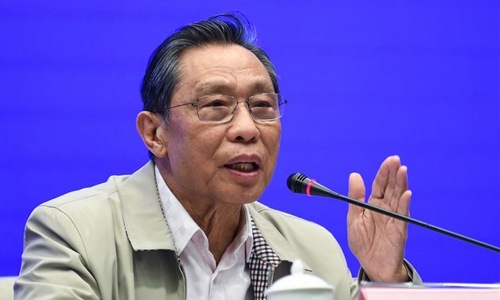Don’t pin high hopes on COVID-19 vaccines: top Chinese medical expert
Source:Global Times Published: 2020/4/12 14:48:40 Last Updated: 2020/4/12 15:58:40

Renowned Chinese respiratory specialist Zhong Nanshan speaks at a press conference in Guangzhou, south China's Guangdong Province, Feb. 18, 2020. (Xinhua/Deng Hua)
There are no specific medicines for coronavirus, although some have turned out to be effective in treating it, said Zhong Nanshan, China's renowned respiratory expert, Academician of Chinese Academy of Engineering, in an interview with People's Daily on Sunday.
Zhong earned international fame for managing the SARS outbreak in 2003.
Zhong said his team is testing the effectiveness of medicines such as chloroquine and traditional Chinese medicine (TCM) formulae such as Lianhuaqingwen and Xuebijing, which have been proved to be effective in treating critically ill patients.
Zhong believed that a vaccine will not be available in the near future and placing all hopes on a vaccine while disregarding other methods is a negative approach.
"I don't think the vaccine will be available in three or four months," he said. "After the vaccine comes out, you can't expect it to be perfect. Highly infective people can get vaccinated, but it is not necessary for everyone to be vaccinated," he said.
He also noted that it is important to identify the intermediate host of the coronavirus.
"Based on our experience of fighting SARS, removing the intermediate host can also curb the epidemic. At present, we do not know the whole chain of how the novel coronavirus spreads. It is also important to cut the intermediate host off after figuring it out," he said.
Regarding the "herd immunity" approach, Zhong said this is the most passive way of fighting the epidemic.
"This idea goes back a hundred years when humans had no choice but to let the virus infect them so that those who survived it naturally obtained antibodies. Now, there are many precautionary methods and there is no need to adopt 'herd immunity,'" he said.
Zhong believes the experience most worthy of sharing in China's success over coronavirus is its strong enforcement ability, especially in locking down the worst-affected areas to block the spread and popularizing precautionary measures among individuals.
"Some countries are more advanced than China in terms of medical treatment and technical strength. However, they were not well prepared and did not take immediate measures, which led to the infection of frontline medical staff. When this defense broke down, things quickly went out of control," he said.
Posted in: SOCIETY